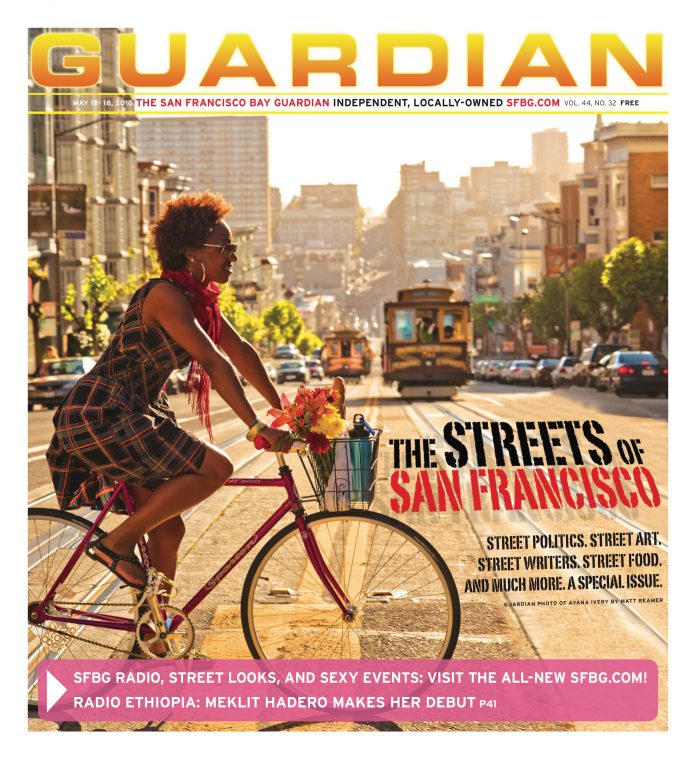rebeccab@sfbg.com
A few crafty, courageous souls have learned to live off of San Francisco’s streets, supporting themselves with tips from random strangers at high-traffic destinations.
Fisherman’s Wharf is such a popular spot that the Port of San Francisco has a map dividing the sidewalk turf into specified performance locations. Between Piers 39 to 41, crowds may encounter break-dancers, spray-paint artists, musicians, or balloon sculptors. Then there are strutters and statues, clad in head-to-toe silver or gold, dancing to tunes blasting out of boom boxes, or frozen still until a tip lands in their tin.
Across the city, a writer has carved out his own street niche. Lynn Gentry pecks away at his Olivetti Lettera 22 typewriter, peering through cat-eyed spectacles at the unevenly inked text. A young black poet sporting an inch or two of vertical hair, seated upon a fold-up wooden chair before a makeshift miniature desk, his gig is summed up in a hand-written sign: “Pick a subject and price then get a poem.”
Gentry isn’t the city’s only busker hocking poems off an old-fashioned typewriter, but he is a regular fixture at the famous corner of Haight and Ashbury. Rather than tailoring his work to a specific style, he spins out spontaneous, lightly punctuated poems and prose, emulating the Beats. Tourists stop often and tip generously, but the locals seem to like him too. One has dubbed him “Professor.” Another seemed excited to pick up a poem he previously ordered, about Libras.
“I chose the Haight because you’ve got a lot of different things going on right here,” Gentry explains. “The longer you sit here, the more you meet the people who live right here, and who were part of the neighborhood’s history.” When not writing, he offers tales and odd historic tidbits. He talks about the 1966 Trips Festival, acid tests, the CIA, and the Summer of Love.
A trio of skinny young women approach, dressed as if they have stepped directly out of that era, and request a poem about “Supercute.” Turns out, it’s their band name.
Gentry first encountered a busking poet when he saw Jacqueline Suskin at the Oregon Country Fair. The son of a poet, he’d written mostly song lyrics before. Now, he says, he’s making ends meet with the street gig. The toughest customer request yet? “Ode to a Menstrual Cycle,” he admits. “It’s the only one that’s taken me three tries.”
Meanwhile, back at Fisherman’s Wharf, a crowd gathers to watch the masked street performer clad in head-to-toe gold. Poised atop a gold milk crate, he shimmies forward, hips swinging, shoulders rolling, and the milk crate shimmies too. He turns a 360-degree spin, and the milk crate spins too. He pauses for a photo with two wide-eyed blond children. Vacationers pause to snap pictures and tip. They might never guess that the man behind the mask is 51 years old.
At Fisherman’s Wharf, everybody sitting on the benches nearby seems to know Shaba, a spry black man who introduces himself as Shabadaba the Gold Man. He wears a gold top hat and an enormous gold clock around his neck. He does his street strutting right across the way from the Bubba Gump Shrimp Co., and says he’s been entertaining at Fisherman’s Wharf since 1977.
“I even beat the Bush Man out here,” he says. (The Bush Man may have the most bizarre self-made gig of all. He conceals himself behind a cluster of bush-like boughs, and then shakes them around, hollering, to scare unsuspecting passersby. It works every time.)
Shaba wasn’t always gold. He used to be silver, but too many others followed suit, so he switched colors. There’s another Gold Man, too, who rolls his tip can up and down his arms, and a few silver performers. One, who calls himself Silver Man, paints his entire head silver — except for an off-center star, which traces across his eyes and down his cheeks — and dances to Michael Jackson tunes wearing star-print pants, a red shirt with wings painted down the back, and one white glove.
“I’m kinda like Father Time out here,” Shaba says. He notes that things have changed over time, and that some performers are now paying the city for permits to be guaranteed a slot, though it isn’t mandated. He springs up suddenly, mumbling something about being unable to sit still.
Back at Haight and Ashbury, Gentry plucks a poem from the typewriter, proofreads it carefully, and hands it over. Here’s an excerpt: “San Francisco keeps trying as I hear the accents of the old neighborhoods that left them behind years ago to start a new life as writers still praise them from afar and the locals hold dying history confused to where they are….”

